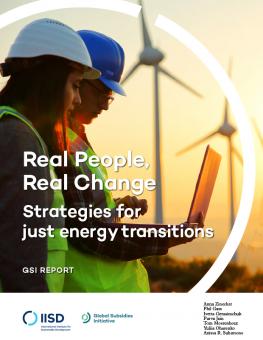
Real People, Real Change: Strategies for just energy transitions
This report aims to support governments in their endeavour to make energy transitions just, building on research and case studies in Canada, Egypt, Indonesia, India, Poland and Ukraine.
Energy transitions are about people—workers, consumers, businesses, communities, taxpayers and voters—who make decisions that lead to transitions and are ultimately affected by them.
The world has seen many transitions in the past, from automation to the decline or relocation of entire industries that led to job losses and the economic decline of regions. This has created a fear of future transitions being similarly painful. Low-carbon energy transitions are already happening in many countries, often due to economic factors or health concerns, but also supported and accelerated by climate change policies. Nevertheless, the actors involved, including governments, businesses, workers and communities, have a tendency to protect the status quo and keep carbon-intensive industries alive. Inaction can be costly. Experiences with past transitions have shown that prolonging the lifetime of declining industries often leads to subsidies, higher costs for worker retraining and unemployment, health and environmental costs, and missed opportunities for the diversification of an economy.
Early action on a just transition can minimize the negative impacts and maximize positive opportunities. The Paris Agreement on climate change includes a just transition as an important principle. A just transition is not a fixed set of rules, but a vision and a process based on dialogue and a tripartite agenda shared by workers, industry and governments that needs to be negotiated and implemented in its geographical, political, cultural and social context. It is implemented with a set of guiding principles, such as the Guidelines for a Just Transition of the International Labour Organization.
Energy transitions can seem daunting, making it difficult to act early. This report aims to support governments of both developed and developing countries in their endeavour to make energy transitions just. It brings together political and communications strategies for a just transition, building on research and case studies of energy transitions that have happened or that are happening in Canada, Egypt, Indonesia, India, Poland and Ukraine.
You might also be interested in
The Cost of Fossil Fuel Reliance
Government support for fossil fuels reached at least USD 1.5 trillion in 2023, new data shows.
How Indonesia's Incoming President Can Advance the Transition to Clean Energy
With Prabowo Subianto inaugurated as Indonesia’s President, speculation abounds about the new administration’s commitment to the clean energy transition and climate targets, given Prabowo’s positioning as the “continuity candidate.” The question is, what, exactly, will be continued?
Public Financial Support for Renewable Power Generation and Integration in the G20 Countries
G20 governments provided at least USD 168 billion in public financial support for renewable power in 2023, less than one third of G20 fossil fuel subsidies that year.
Unlocking Clean Power for All
This report uses tipping point theory to advise where public funding can be strategically directed to catalyze renewable energy deployment in developing and emerging economies.